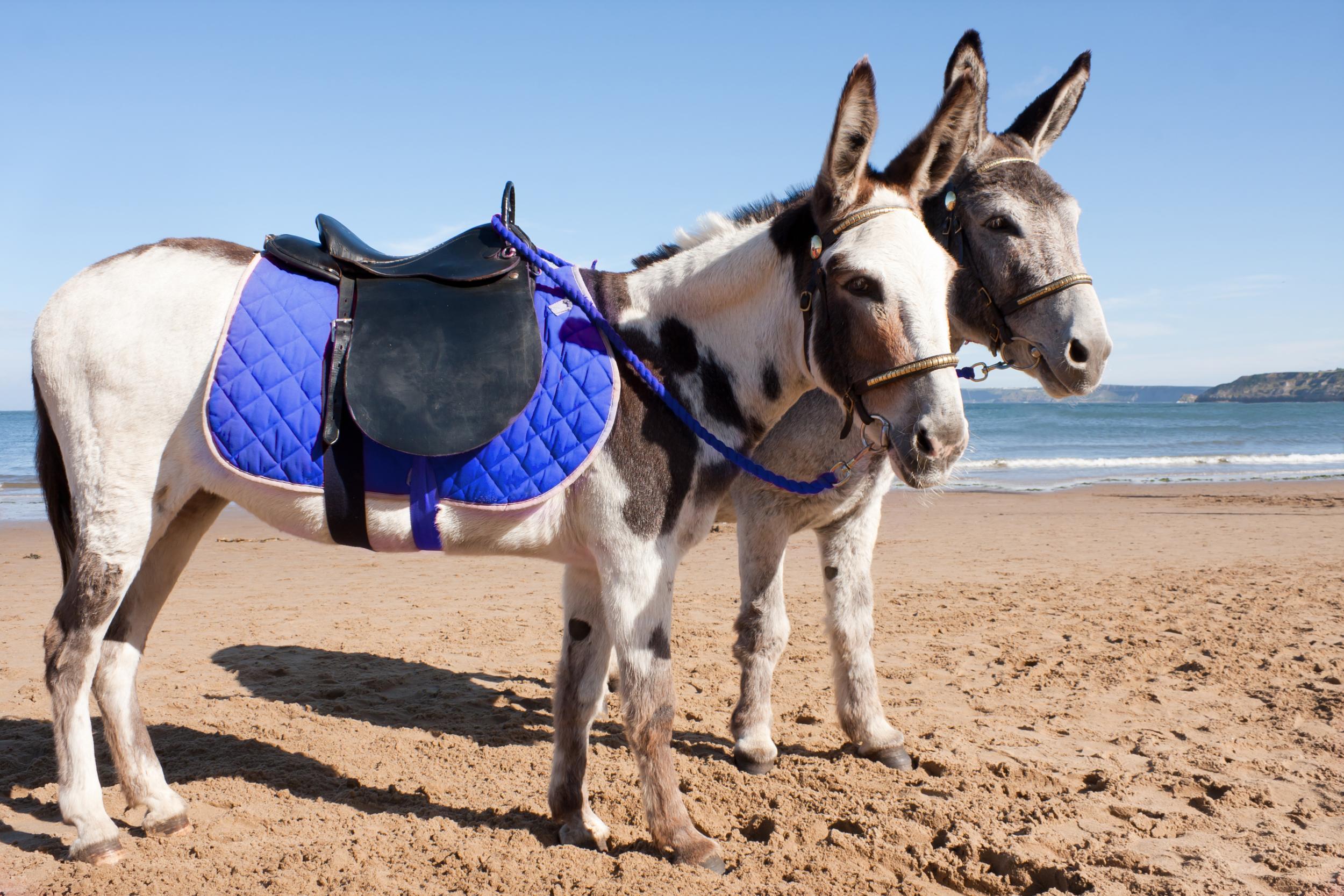They're part of the British seaside experience, but are donkey rides ethical?
Concerns about the welfare of donkeys and mules in tourist destinations, both home and abroad, are growing

Your support helps us to tell the story
From reproductive rights to climate change to Big Tech, The Independent is on the ground when the story is developing. Whether it's investigating the financials of Elon Musk's pro-Trump PAC or producing our latest documentary, 'The A Word', which shines a light on the American women fighting for reproductive rights, we know how important it is to parse out the facts from the messaging.
At such a critical moment in US history, we need reporters on the ground. Your donation allows us to keep sending journalists to speak to both sides of the story.
The Independent is trusted by Americans across the entire political spectrum. And unlike many other quality news outlets, we choose not to lock Americans out of our reporting and analysis with paywalls. We believe quality journalism should be available to everyone, paid for by those who can afford it.
Your support makes all the difference.Donkey rides have traditionally been a quintessential part of the British seaside experience, but is our desire to cling to this part of our coastal heritage actually doing more harm than good?
The Donkey Sanctuary, a UK-based organisation that aims to protect and promote the rights of donkeys around the world, has expressed concern about the use of donkeys and mules in tourist destinations.
They argue that many donkeys are forced to carry heavy loads, including humans, and are often denied access to shade, water and rest for hours at a time.
Concerns have been raised about the use of donkeys on the picturesque Greek island of Santorini in particular.
The animals are used to transport humans and rubbish loads from the port to the town of Fira on a long, steep path, often in scorching weather conditions.
Representatives from the Donkey Sanctuary recently visited the island and were “dismayed” at the conditions they observed.
Closer to home, a petition calling to ban “cruel” donkey rides from Clevedon in Somerset last summer amassed more than 110,000 signatures in less than a week.
The appeal, which called on the local council to ban the rides on Salthouse Fields, a public park on the seafront, was unsuccessful.
Matt Taylor, who has been running donkey rides at Clevedon for over 20 years, told The Express at the time that his animals were well treated and met strict criteria.
“We tend to use three or four donkeys each day at Clevedon. Different donkeys work on different days. We don’t operate on sand, purely on the grass at Salthouse Fields. Donkey rides are very much a British tradition and the seaside donkeys are loved by millions. If they didn’t want to do it they wouldn’t.”
Despite the public’s love for the animals, a spokesperson for The Donkey Sanctuary told The Independent that it “does not actively promote the use of donkeys and mules in any form of tourism.”
They added: “The Donkey Sanctuary does, however, recognise that donkeys and mules form an important part of the social, cultural heritage and economic foundations of many countries.
“In Greece, donkeys and mules are an intrinsic part of the tourism industry, providing families and communities with an opportunity to create a sustainable livelihood. However, animal welfare is key and must be a priority.
“The Donkey Sanctuary has already expressed concern about the current working conditions and practices of many of the donkeys and mules working on the island, with continued challenges around enforcement of regulations and issues such as lack of shelter from the sun, lack of water, excessive working hours and overloading.”
On 13 July, The Donkey Sanctuary and its partner, Greek Animal Welfare Fund/Animal Action Hellas, issued a letter to Mr Nikolaos Zorzos, Mayor of Santorini, requesting a meeting to discuss the ongoing animal welfare concerns affecting many of the donkeys and mules working on the island.

“The international animal welfare organisations seek to work towards a sustainable solution with the Municipality of Santorini and look forward to the meeting that will coincide with a welfare assessment visit that is being planned by The Donkey Sanctuary and Greek Animal Welfare Fund/Animal Action Hellas in the near future,” the spokesperson said.
Those concerned about the welfare of donkeys in holiday or tourist destinations are advised to consider the following factors as part of The Donkey Sanctuary’s STEPS campaign.
Safety: will you be escorted by a conductor at all times during the ride?
Thirst: does the animal have access to clean, fresh water?
Equipment: is the saddle and bridle of good quality or is it causing sores or discomfort?
Pounds: if contemplating a ride on a donkey, are you an acceptable weight for the animal to carry?
Shelter: does the animal have access to shelter during rest breaks?
The Donkey Sanctuary encourages those who are not 100 per cent happy with these answers to avoid riding a donkey or mule.
SaveSaveSaveSaveSaveSave
Join our commenting forum
Join thought-provoking conversations, follow other Independent readers and see their replies
Comments